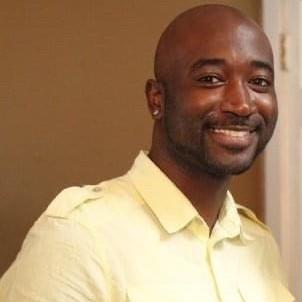Word to the Wise | Carlos Chapman
by Imani Cabassa-George
Hailing from Jacksonville, Florida, doctoral candidate Carlos Chapman decided to embark on his PhD in Criminology at Howard because it was a chosen place for him. After completing his MPH at Morehouse School of Medicine, Chapman found Howard faculty who shared his research interests and also provided an academically supportive environment. “Even beyond my department, the HU community makes the doctoral experience unforgettable,” he says.
This past summer, Chapman applied for and was chosen to participate in the American Institutes of Research (AIR) Pipeline Partnership Program (P3). AIR in collaboration with Georgia State University, Howard University, and The University of Texas at San Antonio, launched the P3 in early 2020 to address a persistent lack of racial and ethnic diversity in the behavioral and social science research (BSSR) fields and ensure that individuals from underrepresented backgrounds are not marginalized or excluded from opportunities, resources and supports to excel in their career pursuits. The P3 program helps to expand the pipeline of scholars with diverse backgrounds coming into the behavioral and social science research fields, and generates awareness of behavioral and social science research career opportunities.
As part of the P3 networking and career advancement activities, AIR has established a mentoring program (P3 ENGAGE) to support doctoral students as they explore career opportunities in research, evaluation, and technical assistance, navigate work-life balance, seek to grow their professional communities, and other related activities. P3 ENGAGE Mentoring is intended to compliment the support students already receive through their doctoral programs and their advisors.
In an interview with The Sway, Chapman shares what led him to this program, and advice for others along their doctoral journey. This article has been condensed and edited for clarity.
The Sway: What made you apply to the P3 ENGAGE Mentoring Program?
Carlos Chapman: I received an email announcement from The Sway about the opportunity. After reviewing additional detailed information for the opportunity, I found that this was one that could further support personal and career professional development.
TS: What have you learned since joining the program? What do you hope to gain from the program?
Chapman: The program just started. We had our initial “meet and greet” about 2 weeks ago. So far, I’ve gained better understanding through hearing past recipients’ experiences in the program. Additionally, more on how the program can best be utilized to help build development and experience not just through the assigned mentor, but also through my cohort. Just from our meeting, I felt the excitement and positive energy flowing through all of us (cohort) as we began to learn about one another (background - grew up, studies, location, commonalities and even indifferences).
TS: What do you appreciate most about your mentor?
Chapman: I haven’t officially met my assigned mentor yet, however from the background information received, I think it will be good a match assignment. Even though we identified different interests in group populations for research, we have more in common and/or similar interests in the field of health research. I am sure we both want to improve diversity and health equity for vulnerable or minoritized populations.
TS: How does the mentoring program relate to your research interests?
Chapman: The mentoring program relates to my research interests by assigning me with an experienced mentor who has already journeyed down the path that I am taking. I have an opportunity to learn and better understand how to solve issues and continue to expand my research career and network with other scholars/researchers.
TS: What do you hope to do next, using the experience from this program?
Chapman: I hope to facilitate or develop some collaborative work with my mentor that can aid in supporting better outcomes for a project(s). Also utilize and apply what’s gained from the program with my future opportunities and next steps in developing research and solutions. Whatever the outcome, it could be shared with others in my network who could also benefit.
TS: Are there any future projects you hope to work on?
Chapman: My interests include helping to improve public health and social injustices outcomes. I hope to continue to work on addressing major public health problems impacting our most vulnerable and at risk populations – not disease specific. I especially would like to build work in advancing better health practices and equity outcomes for men of color.
TS: What advice do you have for future students who might be interested in applying? And once they are in the program, how should they approach it to get the most out of it?
Chapman: Do not miss out on opportunities. If unsure, don’t be afraid to follow up and reach out to the program leads or other mentors within the Graduate School for advice. You never know what’s behind the open door of opportunity. Once you are in the program, make sure to complete the next steps in correspondence email and adhere to meeting dates (as well as additional requests). Do not be nervous but show up with an open mind and some thoughts on what you would like to gain.
TS: Okay, it’s fun fact time: What is your favorite fall experience and why?
Chapman: My favorite fall experience is college football and homecoming season. It’s reconnecting as well connecting with other (new) peers. Also enjoy the camaraderie happening at these events. Also shout to all my brothers of Alpha Phi Alpha Fraternity Inc. One other fun fact is that fall is my birthday season.

